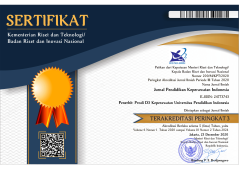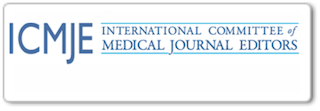PENERAPAN EDUKASI TERSTRUKTUR MENINGKATKAN SELF EFFICACY DAN MENURUNKAN IDWG PASIEN HEMODIALISA DI RSUD INDRAMAYU
Abstract
ABSTRAK
Jumlah kasus chronic kidney disease yang harus menjalani terapi hemodialisa sejumlah 400 pasien dari 1.000.000 penduduk di Indonesia (Situmorang, 2013). Pemantauan keberhasilan hemodialisa diukur dari Inter Dialilytic Weight Gain (IDWG) yang tidak lebih dari 4 % berat kering. Nilai IDWG yang melebihi dari normal menimbulkan gejala edema, sesak nafas, dan rasa tidak nyaman. Salah satu kepatuhan pasien dalam mempertahankan IDWG adalah self efficacy. Penelitian ini bertujuan untuk menganalisa pengaruh edukasi terstruktur terhadap self efficacy dan IDWG pada pasien hemodialisa. Desain penelitian quasi experimen, dengan pendekatan pretest-posttest with control group. Pemilihan sampel menggunakan purposive sampling. Jumlah sampel 38 pasien hemodialisa dibagi dua kelompok 22 kelompok intervensi dan 16 kelompok kontrol. Edukasi diberikan dengan gambar dan video dalam media LCD proyektor dan leaflet. IDWG diukur dengan observasi berat badan sedangkan self efficacy menggunakan kuesioner. Uji statistik menggunakan uji t-dependen dan t-independen. Hasil penelitian menunjukkan pemberian edukasi terstruktur pada kelompok intervensi meningkatkan self efficaccy untuk mengontrol intake cairan antar waktu dialysis (p=0,000, α=0,05), dan menurunkan IDWG (p=0,04, α=0,05). Sedangkan pada kelompok kontrol penerapan edukasi meningkatkan self efficacy (p=0,03, α=0,05), namun tidak menurnkan IDWG (p=0,053, α=0,05). Hasil analisis lanjut menggunakan uji t-independen pada kedua kelompok ditemukan tidak ada perbedaan yang bermakna dalam self efficacy dan IDWG (p > 0,05). Edukasi terstruktur berpengaruh dalam meningkatkan self efficacy dan menurunkan IDWG.
Kata kunci : self efficacy, IDWG, edukasi terstruktur
ABSTRACT
The number of chronic kidney disease with hemodialysis therapy was 400 patients of 1,000,000 population in Indonesia (Situmorang, 2013). The success hemodialysis was monitored by Inter Dialilytic Weight Gain (IDWG) and the criteria was not more than 4 % of dry weight. An excess of IDWG value would cause the symptoms of edema, shortness of breath, and discomfort. Self efficacy was one of patient compliance in maintaining IDWG. The aim of this study was to analyze the effect of a structured education on self-efficacy and IDWG in hemodialysis patients. The study used quasi experimental design, with pretest-posttest control group approach. The sample was selected by purposive sampling technique. The sample was 38 patients, divided into intervention group (22 patients) and control group (16 patients). The intervention of structured education was use pictures and videos by LCD projector and leaflets. IDWG was measured by weight observation, while self-efficacy by questionnaire. The statistical test used t-dependent and t-independent. The result showed that structured education increased self efficaccy to control fluid intake on inter dialysis time (p = 0.000, α = 0.05) and decreased IDWG value (p = 0.04, α = 0.05) in the intervention group. While the intervention increased self efficaccy to control fluid intake on inter dialysis time (p = 0.03, α = 0.05) and decreased IDWG value (p=0,053, α=0,05) in the control group. The results of further analysis used an independent t-test, showed that there were not a significant differences in self-efficacy and IDWG (p> 0.05) between intervention and control group. The structured education caused an increasing of self-efficacy and a decreasing of IDWG value.
Keyword : self efficacy, IDWG, structured education
Full Text:
PDFReferences
Arikunto, S. (2010). Prosedur penelitian kesehatan: Suatu pendekatan praktik. Edisi Revisi 2010. Jakarta: Rineka Cipta
Bandura, A. (2006). Guide for constructing self-efficacy scales. Chapter 14. Self-Efficacy Beliefs of Adolescents. Information Age Publishing. 307-337
Brunner & Suddarth’s. (2004). Textbook of Medical Surgical Nursing, Lippincott Williams Wilkins.
Black, M.J. & Hawk, H.J. (2009). Medical surgical nursing: clinical management for positive outcome, Elsevier, Singapura.
Bonsaksen, T., Lerdal, A., & Fagermoen, M. A. Y. S. (2012). Factors associated with self-efficacy in persons with chronic illness Study design. Scandinavian Journal of Psychology, 333–339. doi:10.1111/j.1467-9450.2012.00959
Hastono, S.P. (2007). Analisis Data Kesehatan, Jakarta: FKM UI.
Husna, C. (2010). Gagal ginjal kronis dan penanganannya: Literatur review. Jurnal Keperawatan. FIKkes Unimus. Vol 3 No 2: 67 – 73.
Hwang, J., Wang, C.T., & Chien, C.C. (2007). Effect of climatic temperature on fluid gain in hemodialysis patients with different degrees of overhydration. Blood Purification, 25(5-6), 473-479.
Ignatavicius, D.D. and Workman, M.L. (2010). Medical-surgical nursing, Patient-centered collaborative care. 6th Edition. St. Louis: Saunders Elsevier Inc.
Lewis, S.M., Stabler, K.A., & Walch, J.L. (2010). Perceived informational needs, problem, or concerns among patients with stage 4 chronic kidney disease. Nephrology Nursing Journal. 37(2), 143-149.
Price, S.A. & Wilson, L.M. (2005). Patofisiology; Konsep klinis proses-proses penyakit. Edisi 4. Jakarta : EGC.
Riyanto, W. (2011). Hubungan antara penambahan berat badan diantara dua waktu hemodialisis (Interrdialysis weight gain – IDWG) terhadap kualitas hidup pasien penyakit ginjal kronik yang menjalani terapi hemodiaisis di unit hemodialisa IP2K RSUP Fatmawati Jakarta. Lontar UI. Tesis
Smeltzer,S.,C., dan Bare, G. (2002). Buku ajar Keperawatan medikal Bedah Brunner & Suddarth, edisi 8 volume 1 dan 3, EGC, Jakarta
Suwitra, K (2006). Penyakit Ginjal Kronik. Dalam Sudoyo, dkk. Buku Ajar Ilmu Penyakit Dalam. Jakarta: Pusat Penerbitan Departemen Penyakit Dalam Fakultas Kedokteran Universitas Indonesia.
Syamsiah, N. (2011). Faktor-faktor yang berhubungan dengan kepatuhan pasien CKD yang menjalani hemodialisa di RSPAU Dr Esnawan Antariksa Halim Perdana Kusuma Jakarta. Lontar UI. Tesis.
Tsay.L.S. (2003). Efikasi diri training for patients with end stage renal disease: Blackwell Publishinh Ltd diperoleh melalui http://ebscohost pada tanggal 8 Oktober 2014
DOI: https://doi.org/10.17509/jpki.v2i1.2941
Refbacks
- There are currently no refbacks.
Jurnal Pendidikan Keperawatan Indonesia(JPKI) published by Indonesia University of Education. JPKI is licensed under a Creative Commons Attribution-ShareAlike 4.0 International License.
Office :
Nursing Department. FPOK UPI.
229, Dr. Setiabudhi Street. Bandung 40154
West Java , Indonesia
E-mail : jpki@upi.edu

_.png)
_.png)
_.png)











